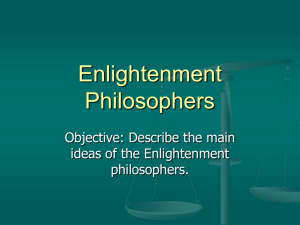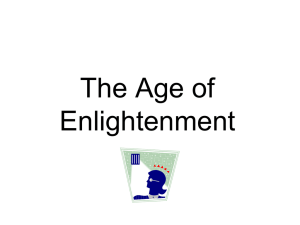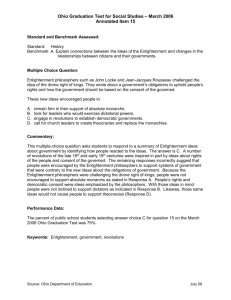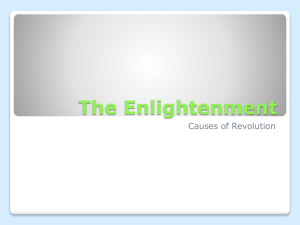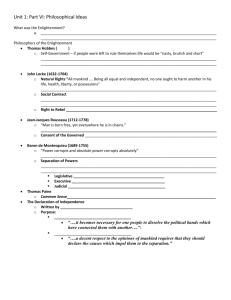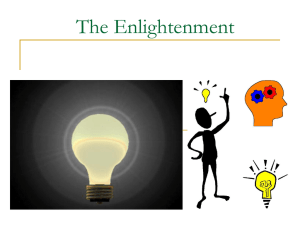Enlightenment was a period in history when philosophers emphasized the use... reason as the best method of learning truth. The period...
advertisement
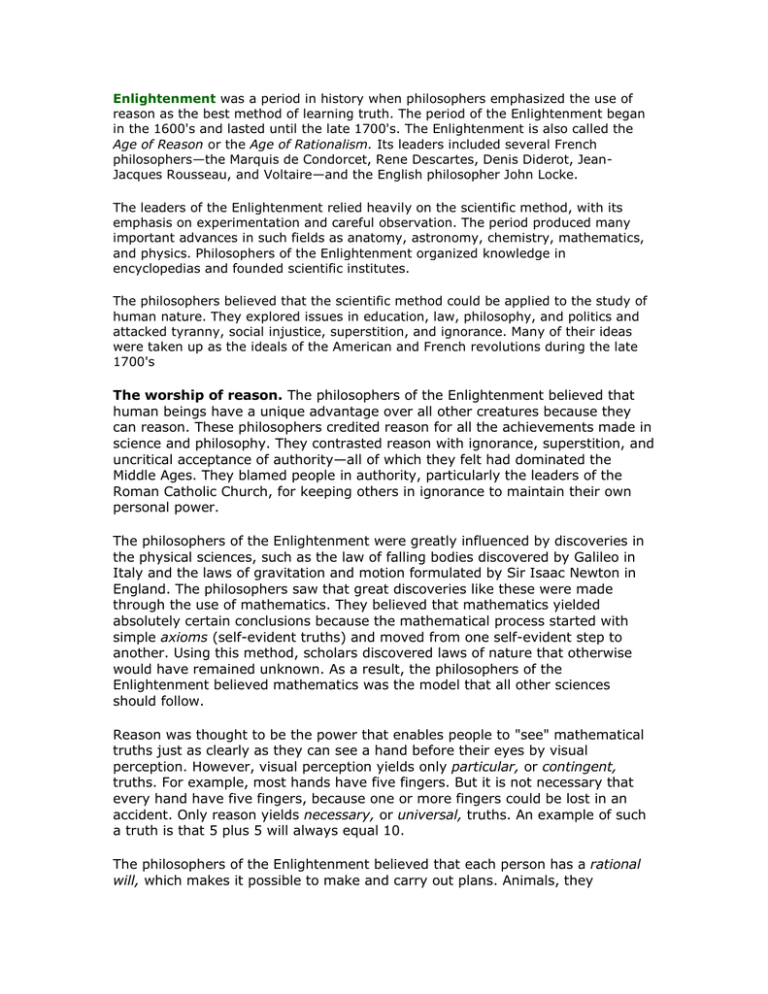
Enlightenment was a period in history when philosophers emphasized the use of reason as the best method of learning truth. The period of the Enlightenment began in the 1600's and lasted until the late 1700's. The Enlightenment is also called the Age of Reason or the Age of Rationalism. Its leaders included several French philosophers—the Marquis de Condorcet, Rene Descartes, Denis Diderot, JeanJacques Rousseau, and Voltaire—and the English philosopher John Locke. The leaders of the Enlightenment relied heavily on the scientific method, with its emphasis on experimentation and careful observation. The period produced many important advances in such fields as anatomy, astronomy, chemistry, mathematics, and physics. Philosophers of the Enlightenment organized knowledge in encyclopedias and founded scientific institutes. The philosophers believed that the scientific method could be applied to the study of human nature. They explored issues in education, law, philosophy, and politics and attacked tyranny, social injustice, superstition, and ignorance. Many of their ideas were taken up as the ideals of the American and French revolutions during the late 1700's The worship of reason. The philosophers of the Enlightenment believed that human beings have a unique advantage over all other creatures because they can reason. These philosophers credited reason for all the achievements made in science and philosophy. They contrasted reason with ignorance, superstition, and uncritical acceptance of authority—all of which they felt had dominated the Middle Ages. They blamed people in authority, particularly the leaders of the Roman Catholic Church, for keeping others in ignorance to maintain their own personal power. The philosophers of the Enlightenment were greatly influenced by discoveries in the physical sciences, such as the law of falling bodies discovered by Galileo in Italy and the laws of gravitation and motion formulated by Sir Isaac Newton in England. The philosophers saw that great discoveries like these were made through the use of mathematics. They believed that mathematics yielded absolutely certain conclusions because the mathematical process started with simple axioms (self-evident truths) and moved from one self-evident step to another. Using this method, scholars discovered laws of nature that otherwise would have remained unknown. As a result, the philosophers of the Enlightenment believed mathematics was the model that all other sciences should follow. Reason was thought to be the power that enables people to "see" mathematical truths just as clearly as they can see a hand before their eyes by visual perception. However, visual perception yields only particular, or contingent, truths. For example, most hands have five fingers. But it is not necessary that every hand have five fingers, because one or more fingers could be lost in an accident. Only reason yields necessary, or universal, truths. An example of such a truth is that 5 plus 5 will always equal 10. The philosophers of the Enlightenment believed that each person has a rational will, which makes it possible to make and carry out plans. Animals, they declared, are slaves of their emotions. When an animal is afraid of something, it tries to escape. When an animal is angry, it fights. However, people can figure out the best course of action when they are afraid, angry, or in trouble. In addition, people can make themselves do the right thing, instead of doing only what may seem easier or more appealing. The philosophers realized that people do not always plan ahead but often act on impulse, which they attributed to inadequate education. All people, the philosophers believed, are born with the capacity to reason. Descartes wrote that "the power of forming a good judgment and of distinguishing the true from the false, which is properly speaking what is called good sense or reason, is by nature equal in all men." Descartes therefore thought that to become rational, a person need only acquire an education that teaches a good method of reasoning. Locke wrote that reason is "the candle of the Lord set up by Himself in men's minds" and "must be our last judge and guide in everything." Locke believed reason teaches that people must unite and form a state to protect their "lives and liberty and property." He noted that although people must give up some rights when they form a state, they gain more in protection than they lose. Locke believed that anyone can reason, providing the capacity is allowed to develop. He therefore emphasized the importance of education and insisted on the right of free speech and on toleration for conflicting ideas. How to cite this article: To cite this article, World Book recommends the following format: Creech, James. "Enlightenment." World Book Student. World Book, 2011. Web. 13 Dec. 2011.
